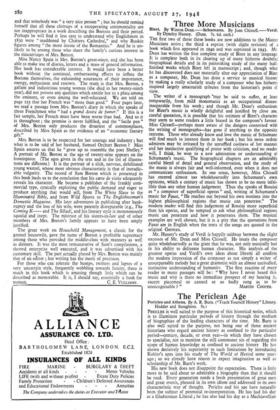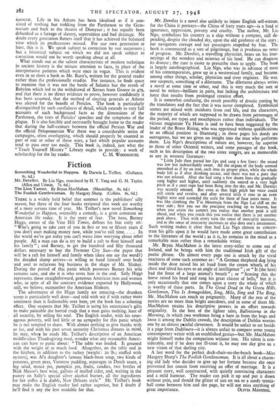The Periclean Age
PERICLES is well suited to the purpose of this historical series, which is to illuminate particular periods of history through the medium of biographies of the leading characters of the time. Mr. Burn is also well suited to the purpose, not being one of those ancient historians who regard ancient history as confined to the particular period—century, decade, or even year—in which they have chosen to specialise, not to mention the still commoner sin of regarding the scope of human knowledge as confined to ancient history He has shown decisively his superiority to such limitations by introducing Kohler's apes into his study of The World of Hesiod some years
ago; we already have reason to expect imagination as well as schoarship of Mr. Burn's work.
His new book does not disappoint the expectation. There is little more to be said about so admirable a biography than that it should be read. Every generation needs a fresh presentation of great men and great events, phrased in its own idiom and addressed to its own characteristic way of thought. Pericles and his age have naturally been the subject of perennial re-interpretation. He has had his day as a Gladstonian Liberal ; he has also had his day as a Machiavellian
autocrat. Life in his Athens has been idealised as if it con- sisted of nothing but trekking from the Parthenon to the Gym- nasium and back to the theatre of Dionysus ; it has equally been debunked as a farrago of slavery, superstition and bad drainage. No doubt every generation flatters itself that it has achieved the balanced view which its predecessors missed. For our own generation at least, this is it. We speak subject to correction by our successors ; but a historical subject on which we did not speak subject to correction would not be worth speaking about at all.
What stands out as the salient characteristic of modern technique in ancient history is the minute attention to facts, in place of the interpretative patterns which were once in vogue. This is evident even in so short a book as Mr. Burn's, written for the general reader rather than the professionally erudite. For instance, he finds space to mention that it was not the battle of Salamis but the revolt of Babylon which led to the withdrawal of Xerxes from Greece in am and that there is no direct evidence to prove, however confidently it has been assumed, that the method of electing generals at Athens was altered for the benefit of Pericles. The book is particularly distinguished by such carefulness of detail, which extends to very full accounts of such background facts as the dimensions of the Parthenon, the texts of Pericles' speeches and the symptoms of the plague. It is also forcibly and necessarily brought home to the reader that during the half-century between the official Persian War and the official Peloponnesian War there was a considerable series of campaigns, often overlapping, which should properly be counted as part of one or other of those wars, a fact which popular accounts tend to pass over too easily. This book is, indeed, just what the " Teach Yourself History " Library ought to provide: a work of



































 Previous page
Previous page